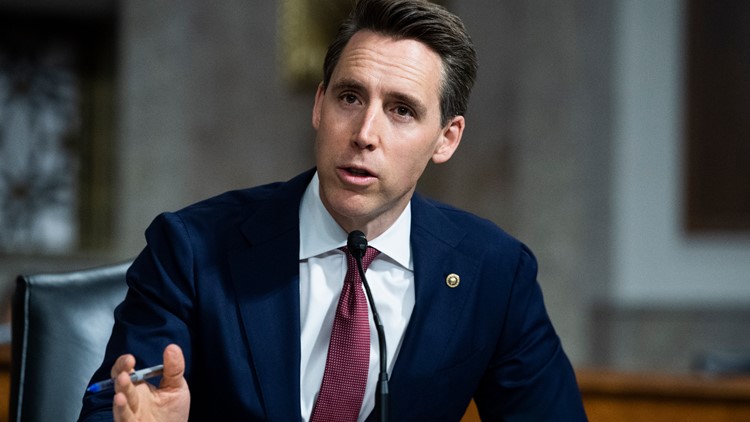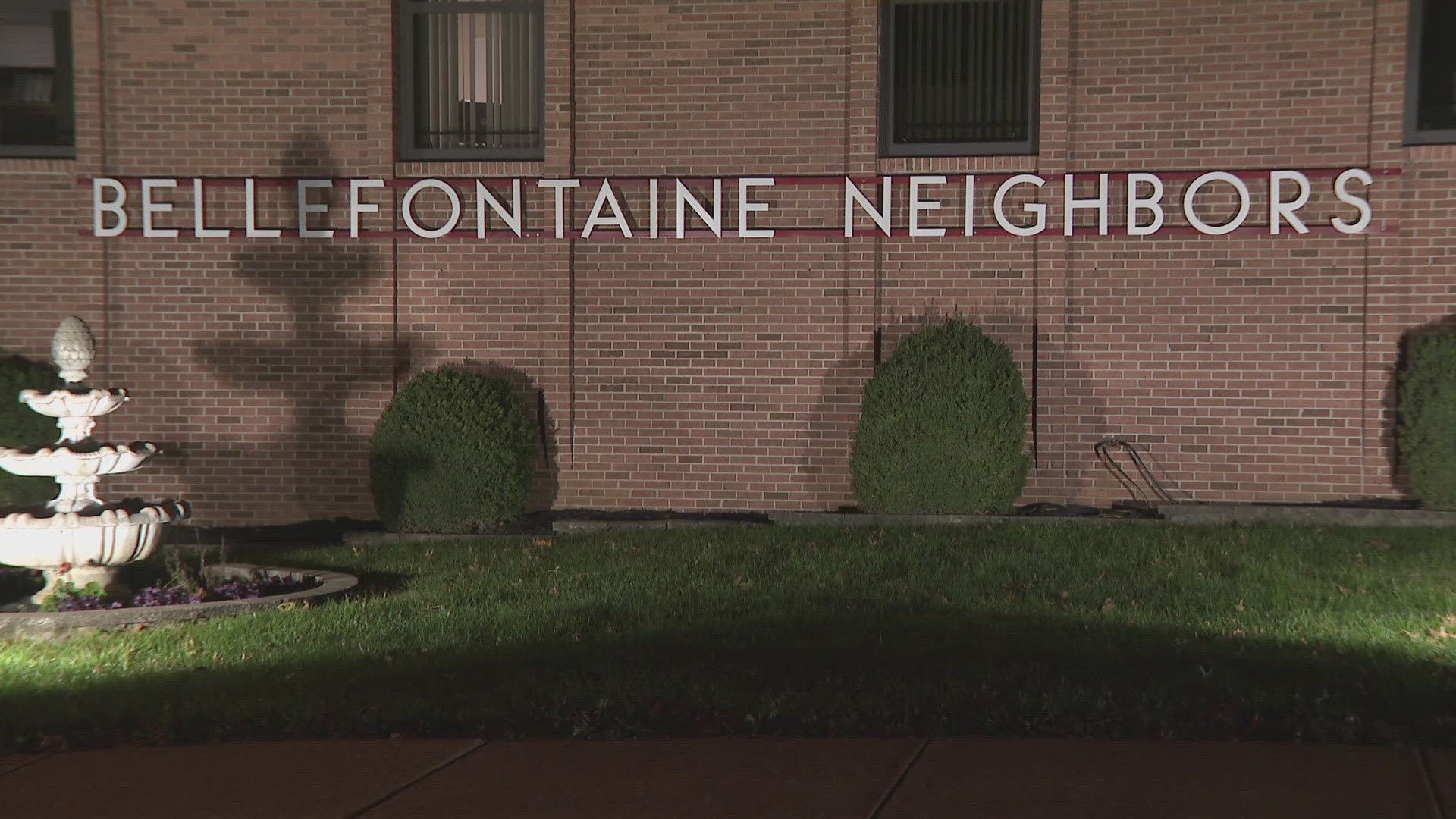ST. LOUIS — 5 On Your Side's Political Editor Mark Maxwell interviewed Senator Josh Hawley (R-Missouri) about the Supreme Court's pending decision to overturn Roe v. Wade this Thursday afternoon.
Below is a full transcript of the interview:
Mark Maxwell: "Representative Cori Bush (D-Missouri) wants to see Senate Democrats abolish the filibuster to enshrine a woman's right to abortion in federal law. If Senate Democrats do abolish the filibuster and say Republicans take the House and Senate next year -- polling shows that likely -- Would you support a national ban on abortion? And if so, which abortions?"
Senator Josh Hawley: "Oh, that's a lot of hypotheticals there. So first of all, let's start with this: They're not going to abolish the filibuster. The Democrats have already said that they won't go along with that. And let's be clear on what they're trying to do here. What they're trying to do is intimidate the Supreme Court. What the Democrats are trying to do is get the justices to change their minds on a case while the case is still under deliberation. That is dangerous. It is a direct affront to Article Three of the Constitution and to the independence of the judiciary. And it needs to stop. By the way, threatening justices personally, which is what the far left is also doing, saying they're gonna go to their homes, they're gonna threaten their families, that is wrong. It is dangerous. And I hope that the American people will see this for the kind of radicalism that this is."
Maxwell: "I didn't hear an answer to the question, though. Would you support a national ban on abortion?"
Hawley: "No, I don't support a federal ban on abortion after Roe vs. Wade, if it's overturned in the first instance. I mean, I think that what needs to happen first is Congress can look for areas where there's national consensus and act on those, and then the people in our states, beginning with the people of Missouri, will finally get an opportunity to weigh in. And I think that's as it should be, and then Congress can act where consensus is. But in the first instance, I would not support a federal ban on all abortions."
Maxwell: "As you know, Missouri is positioned to outlaw all abortion, including those immediately upon conception, once Roe is eventually overturned. Statistics show that Black women and women of color are far more likely than white women to seek an abortion. Why do you think that is?"
Hawley: "I don't know the answer to that question, but I do celebrate the fact that if Roe vs. Wade is overturned that we'll see many, many more children of color in this world, which I think is a wonderful thing."
Maxwell: "CBS News noted just last night that of the 26 states positioned to restrict or outright ban abortion, near all of them do not provide paid family leave, or do not expand Medicaid to offer health insurance throughout postpartum for the mother. If governments, state or federal are going to require women to go through with delivering an unplanned pregnancy, perhaps one they don't want, should then government do more to make that path easier for them?"
Hawley: "Well, if you're asking me about what the states should do, that's going to be up to the states and the voters in the states, and I think that says it should be. I mean, here's the bottom line on Roe: Roe created a constitutional right that doesn't exist, and it took out of the people's hands their decisions, their choices as it relates to abortion and to life. I mean, this is this is a question on which the Constitution is silent. And so it's up to the people to decide it. And I imagine that you're going to see a lot of different approaches in different states. And that's fine. I mean, we're going to have a national debate on this issue. And we'll have it state by state, which is exactly as it should be. And so I look forward to seeing how that debate goes. I'm 100% pro life myself. So I'd support measures that support life and that keep children safe, the unborn safe, who I think are the most vulnerable among us. But I think it'd be a great debate to have."
Maxwell: "You also said that Justice Alito issued a "tightly argued" position. Justice Alito referred to rights that were "deeply rooted in history," even those rights that he referred to before the US Constitution was drafted. So where exactly do human rights come from?"
Hawley: "Well, this is the in... the way you do the constitutional analysis is you look first at the text of the Constitution and to our Bill of Rights. And you see if there is what's called an enumerated right, which is one that's written down. There's no such right to an abortion in our Constitution. But then, you also ask under the due process analysis, you ask, 'Well, are there other rights that perhaps are not explicitly written down, but that are deeply rooted in our nation's traditions and in our nation's history?' And so you look to that as a source, and his opinion marches through that in some detail and finds there is no such right to an abortion. There is no right for the federal government and for judges to take away this issue from the people. And that's why his opinion ultimately turns it back to the people for them to decide."
Maxwell: "Just last week, we discussed free speech and the First Amendment. Then this week, I'm seeing top senators, including Senator McConnell, calling to prosecute anyone who handed over government documents -- authenticated by Chief Justice Roberts -- to the press. I'm a little confused. Which is it? Are those ideas consistent? And what is exactly the Republican commitment to the First Amendment in publishing government documents?"
Hawley: "Has the majority leader call for journalists to be prosecuted?"
Maxwell: "He's calling for someone to be prosecuted. Those are non-classified documents. What's the crime?"
Hawley: "He hasn't called for journalists to be prosecuted, which would be the First Amendment issue there. And what he said is if laws were broken, if, for instance, someone took federal property and disclosed it in contravention of federal law, that that's a crime, and you ought to be prosecuted for it. The First Amendment doesn't protect crimes. It doesn't protect speech that encourages crimes, as a matter of fact. And I just say this: For this leaker, whoever it is, if he or she is a lawyer, they ought to be disbarred, because they've broken their duties to the court, they've broken their duty of professional responsibility. And I'd start with that."
Maxwell: "Does the public have a..."
Staffer: "Senator, we did hit our five minutes."
Hawley: "I'm sorry, go ahead. I'll answer that."
Maxwell: "I guess the question really is about the value of the First Amendment and whether the public has a right to know about what the justices, those nine justices, are thinking, or does the justices' right to privacy to deliberate outweigh the public's right to know?"
Hawley: "The public has a right to know when the decisions are published. And they also have a right to expect that the law will be followed and that their Judiciary will be independent. There's no right to break the law in order to advance your political position. There's no right to reverse and to undermine the integrity of an Article III branch, a constitutional branch, in order to advance your political positions. Those things are not... There's no right to that at all. The First Amendment has never covered that kind of activity. So you'll find me defending the First Amendment to the max, particularly against this administration that doesn't believe in it at all. But breaking laws and then claiming the protection the First Amendment? I don't think so."



